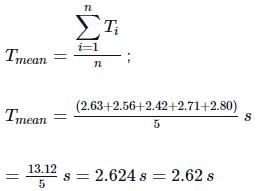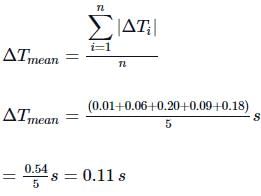Test: Accuracy, Precision of Instruments & Errors in Measurement (NCERT) - NEET MCQ
10 Questions MCQ Test - Test: Accuracy, Precision of Instruments & Errors in Measurement (NCERT)
If the error in measuring the radius of the sphere is 2% and that in measuring its mass is 3%, then the error in measuring the density of material of the sphere is
Which of the following is the most precise instrument for measuring length?
Which of the following time measuring devices is most precise?
Which of the following statements is incorrect?
Which of the following instruments has minimum least count?
The vernier scale of a travelling microscope has 50 divisions which coincide with 49 main scale divisions. If each main scale division is 0.5 mm, then the least count of the microscope is
In an experiment, the period of oscillation of a simple pendulum was observed to be 2.63s, 2.56s, 2.42s, 2.71s and 2.80s. The mean absolute error is
If  and ΔA, ΔB, ΔC, and ΔD are their absolute errors in A, B, C and D respectively. The relative error in Z is then
and ΔA, ΔB, ΔC, and ΔD are their absolute errors in A, B, C and D respectively. The relative error in Z is then
The temperatures of two bodies measured by a thermometer are t1 = 20 °C ± 0.5 °C and t2 = 50 °C ± 0.5 °C. The temperature difference and the error there is
Two resistors of resistances R1 = (300 ± 3)Ω and R2 = (500 ± 4)Ω are connected in series. The equivalent resistance of the series combination is

























